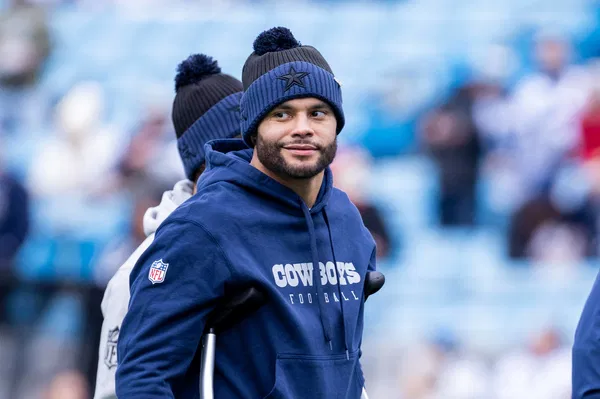
Dak Prescott’s path to securing a massive contract with the Dallas Cowboys was filled with negotiations, risks, and strategic moves. Back in 2019, when Prescott was approaching contract talks, he delivered a standout season, throwing 30 touchdowns and proving his worth as a franchise quarterback. That performance ensured that the Cowboys had little choice but to pay up when the time came for a new deal.
However, negotiations weren’t straightforward. Prescott’s agent, Todd France, was at the center of a lengthy process that saw Prescott initially placed under the franchise tag in 2020. Unfortunately, that season was cut short after just five games due to an ankle injury. As the 2021 season approached, the Cowboys were faced with three options: let Prescott enter free agency, offer him a long-term deal, or apply the franchise tag a second time.
Todd France and the Athletes First team representing #Cowboys Dak Prescott devised a way to include essentially a lifetime no-tag clause in the contract signed in 2021.
France was thinking 2-steps ahead, giving Prescott all the leverage for next deal.
(🎥: @AthletesFirst on YT) https://t.co/MaqtzfVlSb pic.twitter.com/OijuAiJCWB
— Brandon Loree (@Brandoniswrite) April 1, 2025
The Cowboys leaned toward negotiating a long-term contract, though they made it clear that a second franchise tag was still a possibility. During discussions, Dallas proposed a five-year contract, but Prescott’s representatives pushed for a four-year deal instead. The standoff lasted several weeks before both sides agreed to the shorter term.
Despite reaching an agreement, the final numbers weren’t immediately settled, leading to further delays. The Cowboys and Prescott’s camp continued negotiations until the deadline for applying the franchise tag was just around the corner. Eventually, they reached a groundbreaking agreement—one that was strategically structured to maximize Prescott’s earnings early on. The contract was front-loaded, ensuring he made $75 million in the first year alone. Over the first three years, he earned $126 million, averaging $42 million per season.
One of the key negotiation tactics Prescott’s team employed was to request that the Cowboys officially place the franchise tag on him before finalizing the deal. This move was strategic because it ensured that Prescott would technically have been tagged twice, preventing the Cowboys from using the franchise tag a third time, which would have required a much larger payout.
Ultimately, this strategy paid off, allowing Prescott to secure a four-year, $160 million contract. It also set the stage for an even bigger deal in 2024, worth $240 million.
Now, a similar contract situation is unfolding with star linebacker Micah Parsons. Parsons, who has been a dominant force in his first four seasons with 52.5 sacks, is eligible for an extension after the Cowboys exercised his fifth-year option. However, unlike the Prescott negotiations, Cowboys owner Jerry Jones is handling things differently.
Rather than working closely with Parsons’ agent, Jones has opted to negotiate directly with the player. He downplayed the role of agents in contract discussions, stating that an agent “is not a factor” and emphasizing the importance of direct communication with the player. However, Parsons has made it clear that he will not sign a deal without his agent’s involvement.
This situation remains unresolved, but given Parsons’ elite status, it’s expected that he will eventually become the highest-paid non-quarterback in the league. The Cowboys’ handling of his extension could have significant implications, as waiting too long may only drive up the price further.